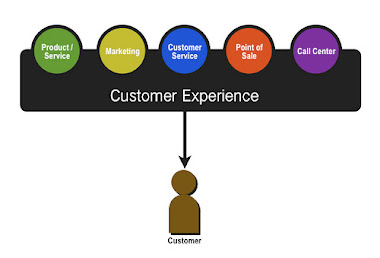Customer experience (CX) is the sum of all experiences a customer has
with a supplier of goods and services, over the duration of their relationship with
that supplier. From awareness, discovery, attraction, interaction, purchase,
use, cultivation and advocacy. It can also be used to mean an individual
experience over one transaction; the distinction is usually clear in context.
Analysts and
commentators who write about customer experience and customer relationship management have
increasingly recognized the importance of managing the customer's experience.
A company's
ability to deliver an experience that sets it apart in the eyes of its
customers serves to increase their spend with the company and, optimally,
inspire loyalty to itsbrand. "Loyalty," says Jessica Debor, "is now
driven primarily by a company's interaction with
its customers and how well it delivers on their wants and needs." (2008)
With products becoming
commoditized, price differentiation no
longer sustainable, and customers demanding more, companies – particularly communications service providers(landline, wireless, broadband, cable, satellite, etc.) – are focusing on delivering superior customer
experiences. A 2009 study of over 860 corporate executives revealed that
companies that have increased their investment in customer experience
management over the past three years report higher customer referral rates and
customer satisfaction (Strativity Group, 2009).
The customer
experience has emerged as the single most important aspect in achieving success
for companies across all industries (Peppers and Rogers 2005). For example, Starbucks spent less than $10MM on advertising
from 1987 to 1998 yet added over 2,000 new stores to accommodate growing sales.
Starbucks' popularity is based on the experience that drove its customers to
highly recommend their store to friends and family.
CEM is a
strategy that focuses the operations and processes of a business around the needs
of the individual customer. Companies are focusing on the importance of the
experience. Jeananne Rae says that companies are realizing that "building
great consumer experiences is a complex enterprise, involving strategy,
integration of technology, orchestrating business models, brand management and
CEO commitment. (2006)
According to
Bernd Schmitt, "the term 'Customer Experience Management' represents the
discipline, methodology and/or process used to comprehensively manage a
customer's cross-channel exposure, interaction and transaction with a company,
product, brand or service


No comments:
Post a Comment